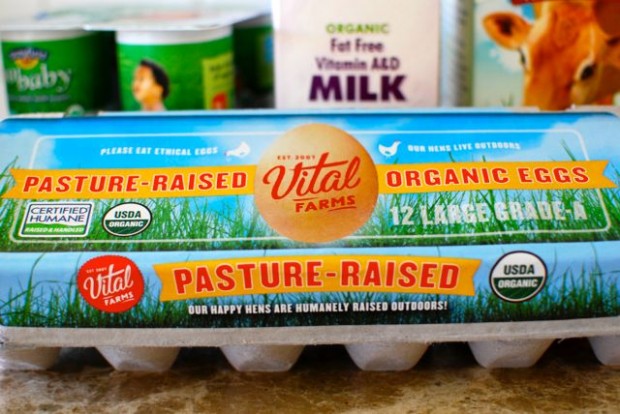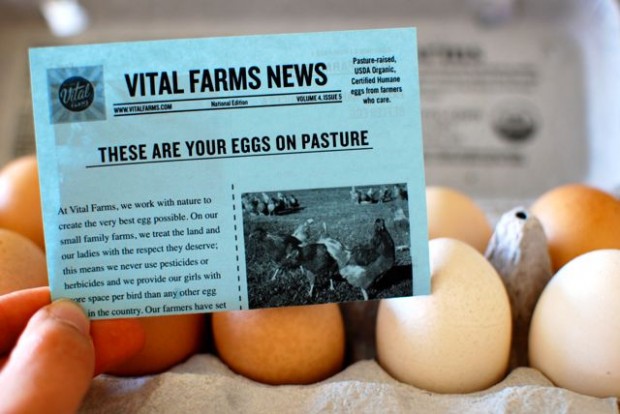When you pick up a carton of “cage free” eggs, you’re probably not picturing a warehouse packed with hens who have no access to natural light or fresh air and who have never been able to engage in natural hen behaviors. I doubt you assume that the hens laying your eggs ate food laced with GMOs, pesticides, feather-meal and other types of waste. But sadly, this is all likely the case, because the term “cage-free” doesn’t mean much.
To make sure your eggs come from humanely-raised hens, look for the words “organic” – or even better: “pasture raised” on the carton label.
Not only do these eggs support sustainable farming, but they are also more nutritious and taste much better. Vital Farms is one of my favorite brands because I can always find them at my local Whole Foods, and I like that they show me a picture of the hens who laid my eggs!
There are lots of other great ethically produced eggs, and many of them are only sold locally — so check out your local grocery store to see what’s offered in your area. Here’s some more information about egg labels to help guide your purchasing. These are listed from best to worst.
1. Pasture-raised Organic. The ultimate in quality, taste and animal welfare. These hens are raised outdoors with plenty of room to perch, forage and act like birds. They are frequently moved on to fresh grass and their feed is USDA Certified Organic. The birds’ lifestyle and varied diet make these eggs superior in flavor, texture and nutritional content. Wholesale cost is about $4.50-5.50/ dozen.
2. Pasture-raised, non-organic. These hens are raised outdoors with plenty of room to perch, forage and act like birds. They are frequently moved on to fresh grass and their feed is high-quality, vegetarian and non- organic. The bird’s lifestyle makes these eggs superior in flavor. Wholesale cost is about $3.50-4.50/dozen.
3. Organic. These hens are for the most part, raised indoors and should be given access to the outdoors (this does not always happen). They eat only USDA Certified Organic feed. While they have limited space, they are not caged and do eat a quality feed ration free from pesticides, herbicides and GMO-ingredients. Wholesale cost is about $3.50-4.50/ dozen.
4. Cage Free / “free-range.” These birds are raised in a warehouse of up to 100,000 hens per house. They never see natural light, breathe fresh air or see a blade of grass. Their feed is non-organic and laced with GMOs, pesticides and sometimes even blood-meal, feather-meal and other types of waste. Their lives are spent breathing fecal dust, standing in their own excrement. Wholesale cost is about $2.50/ dozen.
5. Caged. Same as #4, but these birds are jammed into a cage with up to eight other birds, unable to stand up or turn around their entire life. They eat low-quality feed from a conveyor, lay eggs onto a conveyor and even poop onto a conveyor. Same issues of feed and fecal dust as #4. Caged eggs are now illegal in the EU and California. Wholesale cost is about $1.50/ dozen.
More information about what to look for when buying eggs.
Egg information provided above is courtesy of Vital Farms, but this is not a sponsored post and I received no compensation to mention any particular brand.









7 Comments
Lisa
March 3, 2013 at 7:08 pmI am concerned about GMOs but am told I shouldn’t be when it comes to eggs because chickens are not like humans where what they eat goes to the egg. Do you know if this is true, or not?
Amelia
March 4, 2013 at 3:52 pmI’ve heard the same thing, but only from chicken and egg producers, so I’m not necessarily convinced. If you buy organic eggs, they will be eating organic feed which is not allowed to contain GMOs, so that’s your best bet.
Rhonda
May 14, 2014 at 11:44 amI am disgusted. I grew up on a farm and didn’t even have to think about these things. Now that I’m grown and have my own family, and don’t live on a farm, I’m starting to navigate my family toward “clean eating”. I didn’t even realize that’s what I had done my whole life living on a farm, it was just normal eating to us. As I do more and more research on the things I now have to buy – like eggs – that we didn’t have to think about growing up, I am disgusted. Cows and chickens never grazing and not even eating real food themselves? A chicken that spends its entire life unable to move? I am feeling very ignorant reading this but also really, really disgusted. We eat eggs almost every morning. I will be spending a little more on pasture-raised organic eggs from now on.
Amelia Winslow
May 14, 2014 at 2:39 pmSorry to disgust you, Rhonda! The good news is, you have control over what kind of eggs you buy, so you can immediately switch over to pasture-raised and feel good about the farms you’re supporting from now on 🙂
It’s true, things have really changed when it comes to farming – what used to be a given is now a rarity. Hoping this slowly changes as awareness builds and the environment demands something different.
karie miller
February 5, 2016 at 3:49 pmI am so angry. All the time buying cage free, free range eggs now to find this doesn’t mean anything about the life of the hens. I do know these eggs taste so much better than the “other” choices. Now I will look for the pasture raised eggs. So sad we have to be so aware to make the right choices. All available choices should be healthy.
Amelia Winslow
February 6, 2016 at 1:32 pmHi Karie,
I know how you feel. It’s disturbing when we realize we’ve been duped by terms on food labels. But rest assured that cage-free, free-range eggs are at least better than eggs from caged hens, and some companies who claim those terms ARE raising hens humanely. Pasture-raised and pasture-raised organic are just better bets. Keep up the good work with label-reading 🙂
Shjaron
May 15, 2017 at 12:28 pmHello,
I live in Lake Havasu City Arizona. Where might I be able to purchase “Pasture Raised Eggs?”
Thank you, Sharon